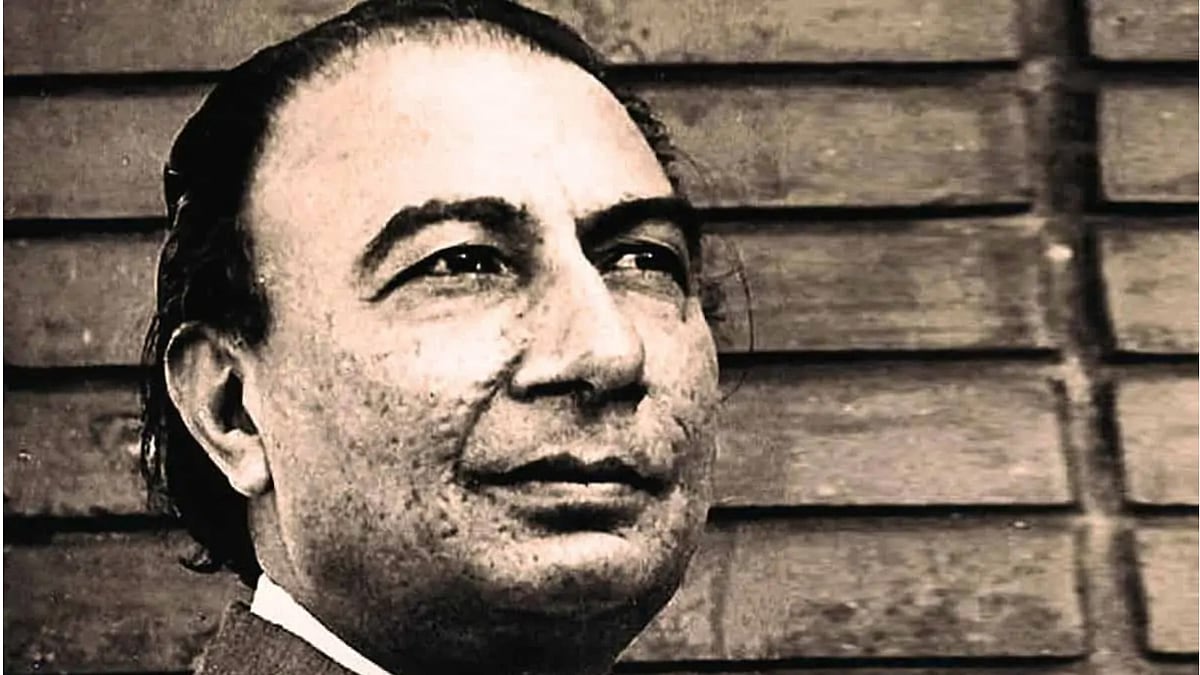Art and Culture
An unfading flame: Sahir Ludhianvi's enduring relevance in a fractured world
Ludhianvi’s prodigious craft was shaped by a turbulent youth and the emotional turmoil of his parents’ separation

Today, 25 October, marks the 45th death anniversary of Sahir Ludhianvi (born Abdul Hayee, 1921), whose 'magical' pen name veiled an uncompromising social conscience.
Sahir’s poetry, once a soundtrack for a newly sovereign nation, persists as a revolutionary manifesto, speaking directly to the ills that scar today’s world. His most fitting epitaph lies within his own words — a testament to immortality and resistance:
Jism ki maut koi maut nahin hoti/ Jism mit jaane se insaan nahin mit jaate...
(The death of the body is no death at all; when the body perishes, the human does not simply vanish)
Genesis of bitterness and brilliance
Sahir’s prodigious craft was shaped by a turbulent youth. Born into a landed Ludhiana family, he was marked by the emotional turmoil of his parents’ acrimonious separation and the suffering endured by his mother, Sardar Begum.
These trials seeded in him a profound empathy for society’s outcasts — a central thread in his work.
The bitterness, or Talkhiyan, of his upbringing became the title of his inaugural collection, published in Lahore when Sahir was just 24, blending romantic reflection with a progressive gaze. His restless and compassionate spirit emerges unforgettably in his explorations of thwarted love:
Kabhi kabhi mere dil mein khayaal aata hai/ Ke zindagi teri zulfon ki narm chhaaon mein/ Guzarne paati to shaadaab ho bhi sakti thi
(Sometimes it crosses my heart/ If life could pass beneath the soft shade of your hair/ Perhaps it could have blossomed)
Published: undefined
After earning his voice in journalism and editorial work for Urdu publications, Sahir’s inflammatory remarks drew the wrath of Pakistan’s authorities, compelling his migration to Bombay in 1949.
This pivot, a loss for Urdu letters, was a splendid gain for Hindi cinema, where for three decades, Sahir’s pen created an enduring legacy for 'the poet of the people'.
Fierce defender of dignity
Radical empathy is a pulse in Sahir’s art, particularly in his unwavering championing of women’s dignity. That he was born on International Women’s Day (8 March) is a fitting footnote; Sahir revered women not only as muses but as rebels and creators forever subject to assault and erasure. His piercing indictment of centuries-old patriarchy is unambiguous:
Aurat ne janam diya mardon ko/ Mardon ne usse bazaar diya
(A woman gave birth to men, men turned her into merchandise)
He never compromised in his defiance of commodification:
Log aurat ko faqat jism samajh lete hain.
(People think of a woman as nothing but a body)
For Sahir, protest poetry was never empty rhetoric, but a mirror raised to social hypocrisy and injustice. Rooted in Sufi calm and relentless critique, his vision embodied the syncretic Ganga-Jamuni culture, affirming the indivisibility of humanity.
Undying voice of anti-war and anti-tyranny
Sahir’s indictment of oppression and war remains vividly consonant with contemporary reality. His thunderous challenge to authority from his 1949 collection Avaaz-e-Adam persists:
Dabegi kab talak awaaz-e-Adam, hum bhi dekhenge
Rukenge kab talak jazbaat-e-barham, hum bhi dekhenge.
(How long will the voice of man be suppressed, we too shall see/ How long will suppressed emotions remain shackled, we too shall see)
His poem 'Khoon Phir Khoon Hai' penned after Patrice Lumumba’s assassination, was a chilling warning to tyrants everywhere:
Zulm phir zulm hai badhta hai to mit jaata hai/ Khoon phir khoon hai tapkega to jam jaayega
(Oppression vanishes as it grows/ Blood congeals once it starts to flow)
Published: undefined
His second major collection, Parchhaiyaan (shadows), stands as a near-prophetic anti-war document. It lays bare the terrifying impact of conflict on individual life and emotion:
Guzashta jang mein ghar hi jale magar is baar/ Ajab nahin ke tanhaiyan bhi jal jaayen
(In the last war, only homes burned/ But this time even solitude may be set ablaze)
When poetry elevated cinema
Though some critics lamented Sahir’s pivot to films, he never let commercial constraints tame his art. Instead, he liberated popular lyricism, demanding poet’s royalties and respect equal to composers. His songs, deeply philosophical, personal, and political, have immortalized masterpieces such as:
- Philosophical despair: Yeh duniya agar mil bhi jaye toh kya hai (Pyaasa, 1957)
- Secular idealism: Tu Hindu banega na Musalman banega (Dhool Ka Phool, 1959)
-Transcendental Love: Ishq azad hai, Hindu na Musalman hai ishq (Barsaat Ki Raat, 1960)
Despite fraught relations with composers such as S.D. Burman and O.P. Nayyar, Sahir’s stubborn refusal to compromise resulted in enduring collaborations, especially with Roshan, Khayyam, and Ravi, birthing songs that echo across generations.
Undying flame of an unclassifiable genius
Sahir Ludhianvi passed away in Mumbai on 25 October 1980 after a cardiac arrest, and was honoured with the Padma Shri in 1971. Yet his truest legacy lies in his timeless relevance.
Sahir resisted all categorisation — simultaneously revolutionary and romantic, sceptic and mystic, both witness and conscience for an age marked by war and betrayal. He once humbly described himself:
Main pal do pal ka shaayar hoon/ Pal do pal meri kahani hai...
(I am a poet for a fleeting moment/ My story is for but a moment...)
Yet as long as there is injustice, yearning, and dignity to champion, Sahir’s powerful declaration will echo into our uncertain future:
Maut kitni bhi sangdil ho magar/ Zindagi se to meherban hogi.
(No matter how cruel death may be/ It will always be kinder than life)
Hasnain Naqvi is a former member of the history faculty at St Xavier’s College, Mumbai. You will find more of his writing here
Published: undefined
Follow us on: Facebook, Twitter, Google News, Instagram
Join our official telegram channel (@nationalherald) and stay updated with the latest headlines
Published: undefined